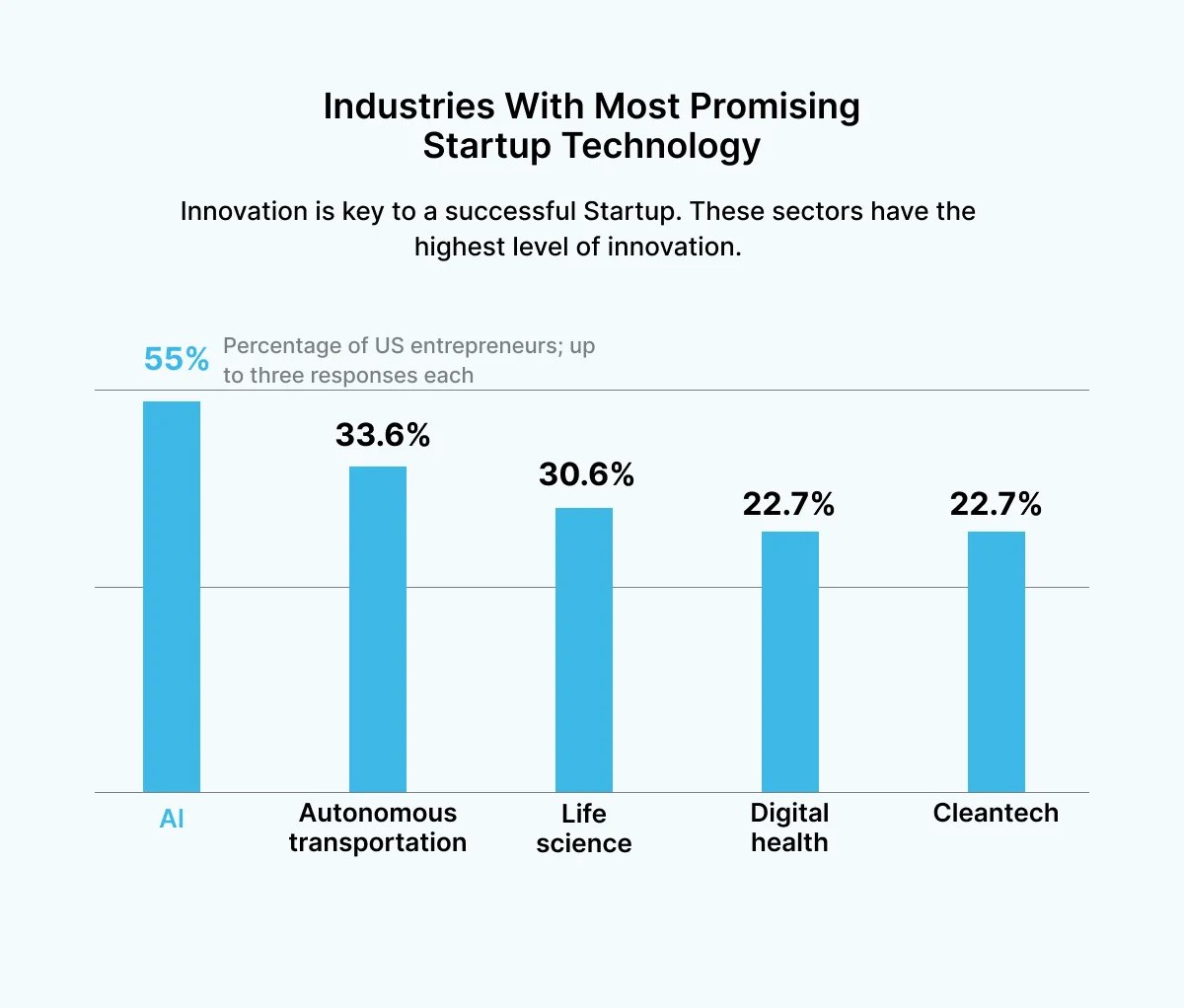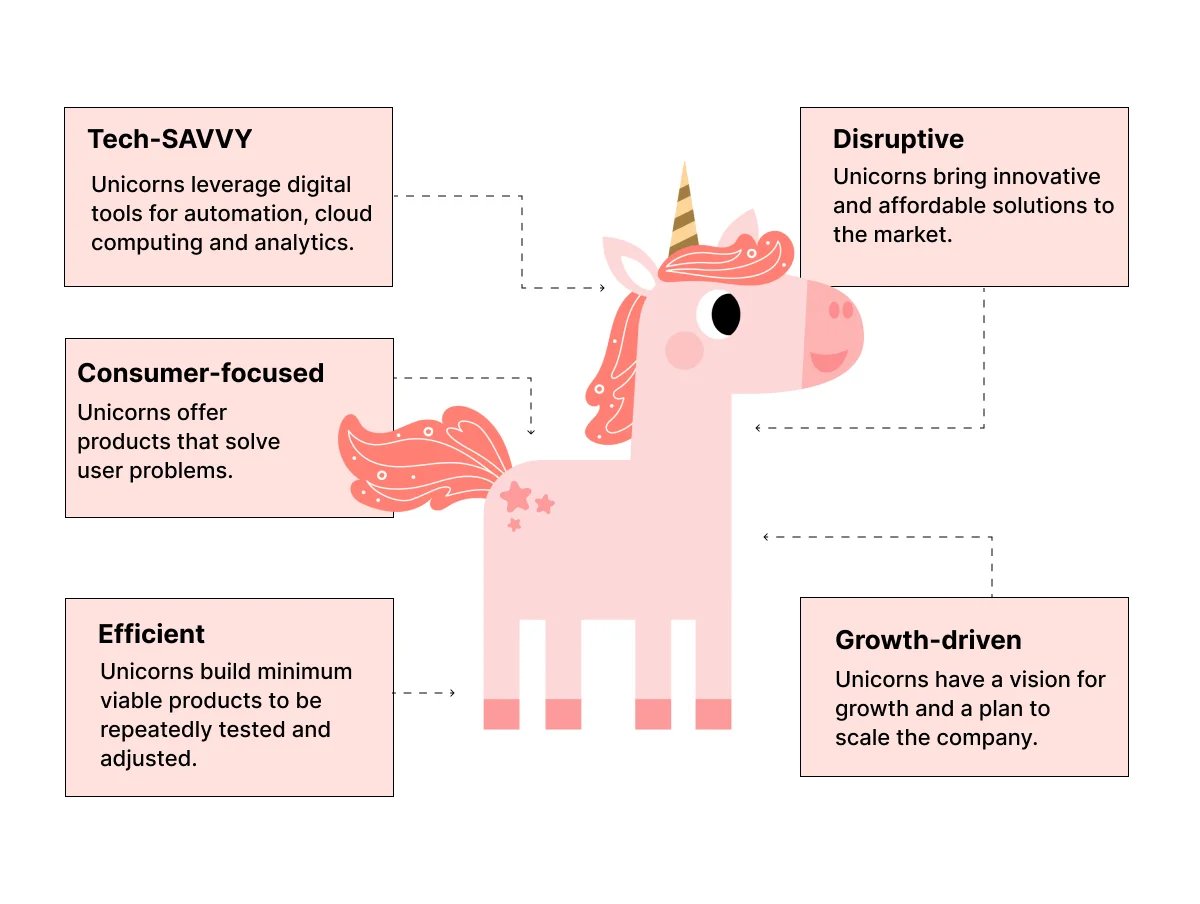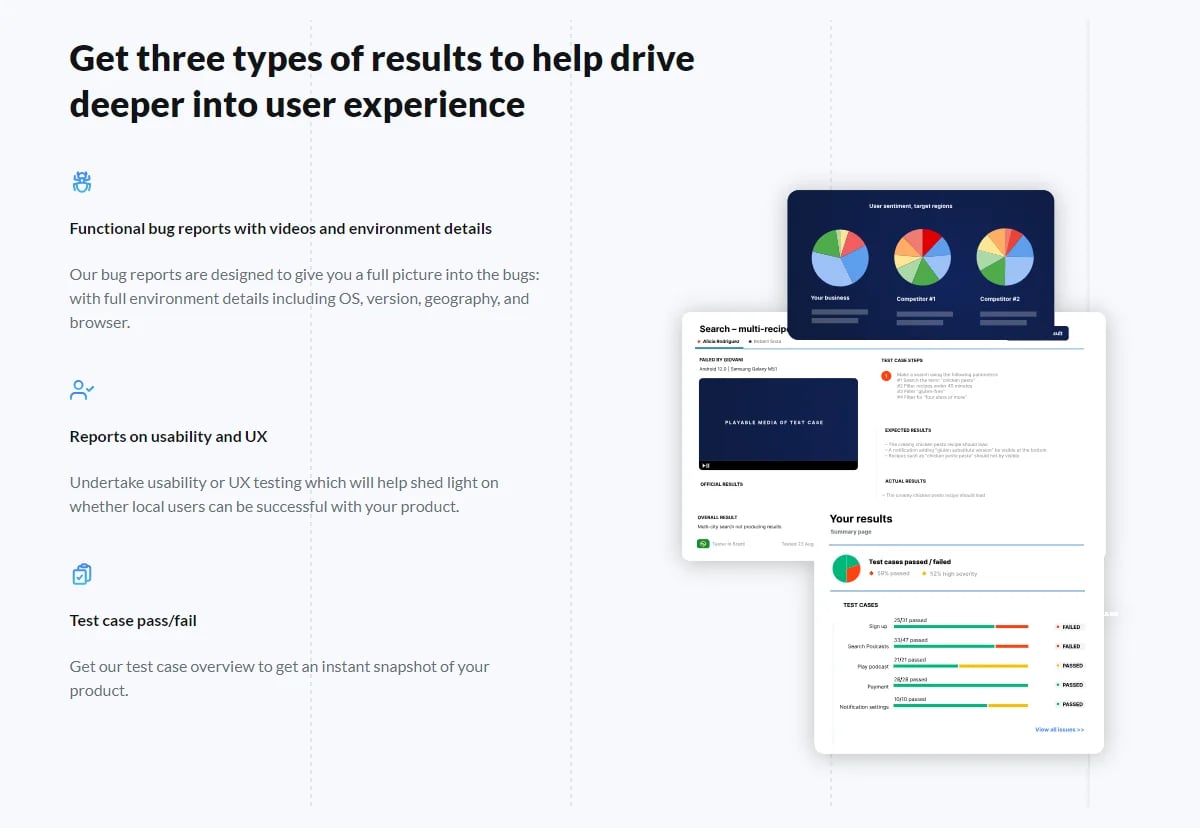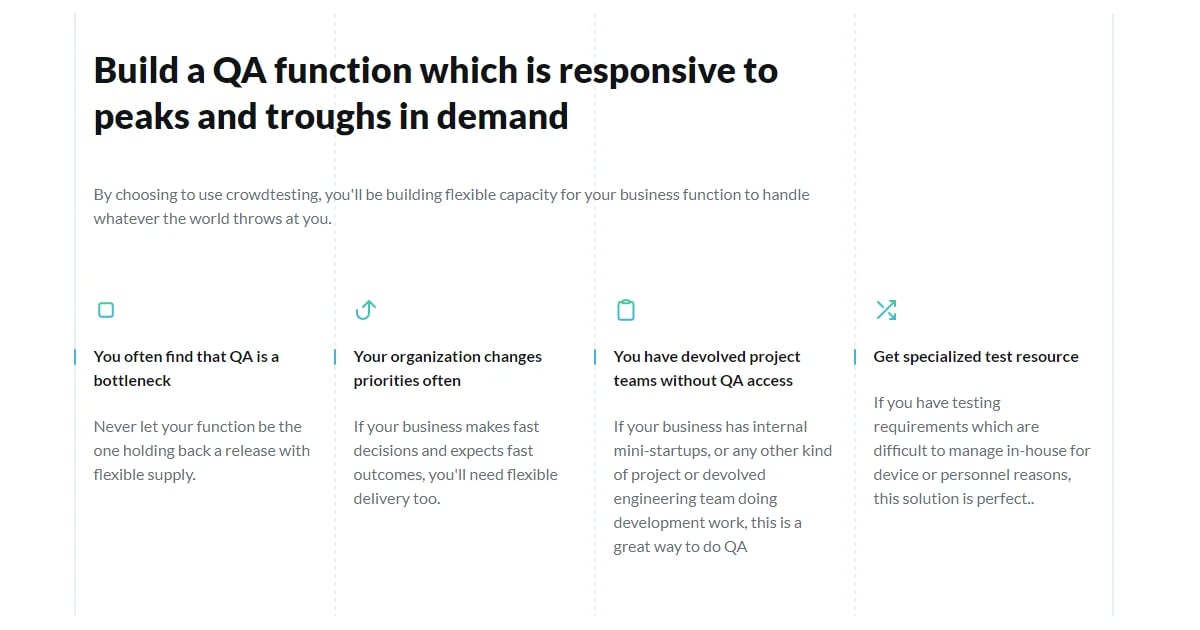Why is testing important for tech businesses
We’ve got some bad news for tech businesses….software bugs are inevitable.
Even with a highly qualified and capable product team, mistakes do happen. We are all human. So, testing is essential for companies who want to deliver high-quality software and spot bugs before their customers do.
But testing isn’t just for massive corporations with an endless QA budget. It can be hugely beneficial for smaller companies looking to scale up their product, provide a great customer experience, and build a brand people trust.
Key statistics
New businesses are like a constantly moving jigsaw puzzle; they require you to think outside the box and be open to trying experimental solutions. As an entrepreneur, you must exhibit not only expertise but mental agility. You should be adaptable since something as simple as better competitors or some regulations pinching your bounce could unexpectedly change the game.
Using creative agency management software can streamline your processes, helping you adapt quickly and stay competitive in a dynamic business landscape.
Here are some statistics to think about:
- Globally, there are over 150 million startups, with approximately 50 million new startups established annually, equating to around 137,000 startups launched daily. However, only 10% of these startups manage to sustain themselves in the long term.
- In the United States alone, there are 77,927 startups, with a significant concentration emerging from Silicon Valley, making the U.S. the global leader in startup numbers. Following the United States, India boasts 16,323 startups.

Why do even tech businesses need testing?
Although many aspire to transform their idea into a billion-dollar IPO, most businesses fail. However, those who do succeed often become industry pioneers, generating numerous high-paying jobs and introducing groundbreaking innovations. Testing is important in setting up a business for long-term success, especially for those interested in alternative investments in the tech sector.
To achieve "Unicorn" status, businesses typically require substantial funding. Angel investors and venture capital firms are known to inject millions into companies, even before they acquire their first customers. Nevertheless, having a brilliant idea alone isn't sufficient; it's imperative to focus on perfecting the product's functionality.

No product, particularly those from startups, is devoid of defects or flaws at any stage of development. Ensuring that a software product or application operates or performs as intended is a separate challenge altogether.
Every startup aspires for its product or service to stand out, and this largely depends on how well its product performs. This is where Quality Assurance (QA) testers play a crucial role.
Ultimately, a thoroughly tested product is what enhances the end-user experience.
Hear from the experts
"Launching a startup is difficult enough as it is. From fundraising to marketing and user acquisition there are many pieces of the puzzle that have to come together to be successful. The last thing you want to do is make it more difficult for yourself and your team by launching software that has bugs and a bad UX/UI. The best way to refrain from doing that is thoroughly testing the software before launching it. If you are putting out good reliable software with minimal bugs, the easier you the other facets of running a startup will be."
- Vivek Chugh, Founder & CEO, Listables
What are the QA testing challenges in tech businesses and solutions
Running businesses is undeniably challenging, regardless of how innovative the idea or well-executed the process may be. Addressing and resolving challenges, particularly those related to meeting user needs, are essential aspects of business operation.
1. Insufficient funds
Lucky few have big enough budgets to cover all the operational needs, such as hiring additional team members and paying for equipment or offices. These money constraints can make it difficult for business to test their software thoroughly, which may result in missed tests or overlooked bugs, compromising the software's quality and reliability.
Solution
- Instead of allocating excessive time to features of lesser importance, prioritize testing critical ones that foster top-notch user experience.
- Use automated tools and platforms to speed up the testing procedure, regardless of limited resources.
- Implement cloud-based testing frameworks that enable scalability and flexibility, eliminating high expenditures on buying and maintaining hardware.
- If you can’t hire the whole QA testing team, consider outsourcing a part of it to companies such as Global App Testing.
Hear from the experts
"When you're a startup with zero brand recognition, you have ONE chance to make a good first impression. That means your onboarding process and first-time usage of your app needs to go off without a hitch for your users. As a startup, you realistically don't have the budget or time to acquire and test your app on every possible configuration of devices/OSs and app environments. At the same time, you can't possibly conceive of the ways in which users of your app will misunderstand how your app works or otherwise do the "wrong" thing. You'll still never catch every single bug, but respecting your users' time by catching and fixing those bugs you can identify through testing your application before launching is the least you can do for them. "
- Alex Trup, Co-founder of Rolo
2. Not mimicking real-world User Experience
The task for tech business is to guarantee that their product provides an effortless user experience coupled with achieving a solid function on a range of devices, browsers, and operating systems without fault.
Solution
At GAT, we want you to see what your users see and feel:
- Usability and Beta Testing: We engage real users to interact with the product, gathering usability feedback and identifying improvement areas before launch.
- Device and Browser Testing: Comprehensive testing on 60,000 devices, browsers, and operating systems to ensure compatibility and performance across various platforms.
- Responsive Design and Testing: We test for responsive design principles and utilize testing techniques such as UI/UX and usability testing to ensure the application adapts effectively to different screen sizes and resolutions, delivering a consistent user experience across devices.

Hear from the experts
“You only get one chance at a first impression, and as a start-up that could be the difference between success and failure. Investing in the testing process means that your users aren’t going to be turned off by a buggy app or website right off the bat. And it’s not just processes that need testing, make sure you’re doing cross-browser and device testing too. It’s just as important and often forgotten. You want to give your start-up every chance of succeeding, so don’t fall at the first hurdle - it might increase your budget, but it’s money well spent.”
- Mike Gilfillan, Lead Developer, Edge of the Web
3. Slow development and delivery
Tech businesses frequently embrace Agile methodologies to facilitate rapid and frequent iterations and releases. This necessitates more frequent software releases or updates, which can pose challenges for traditional QA testing processes in maintaining pace without compromising quality.
Solution
- Implement Continuous Testing: Incorporate manual and automated testing throughout the development cycle to promptly identify and address issues. Continuous testing ensures the delivery of stable and dependable products at a faster pace.
- Shift-Left Testing: Involve the Quality Assurance team from the project's outset, engaging them in requirement gathering and design phases. This proactive approach helps preempt or resolve potential issues early, minimizing rework and ensuring the final product meets quality benchmarks.
Hear from the experts
"Software testing is vital at every stage of development. At times, it's necessary for a startup to release the MVP of any given feature or functionality to get a sense of how users will engage (or not engage) with something. At Cover, we always have the customer top-of-mind, and we want to make sure that every touchpoint they have with our company is a positive one. You need to move fast but you also need to be intentional and cautious with your decisions –– this can mean rolling out a feature to only 20 or 30 percent of our users or doing more background research before implementation."
– Anand Dhillon, CTO & co-founder of Cover
What are the benefits of testing for tech businesses?
Businesses rely on software to optimize their processes, interact with customers, and attain their goals, whether building an online store or crafting a mobile app. However, this reliance shows the critical need for QA to guarantee the software operates effectively and satisfies user requirements. Here is how:
1) It helps you improve software quality
You might be asking yourself:
“How can I ensure quality in the software I create?”
It’s not as hard as you might think! A well-executed testing strategy is a surefire way to ensure you deliver a quality product time after time. Why not take a retrospective look at your testing strategy from last year? What were the big wins? Where do you think you can improve? It’s not too late to rebuild or develop your QA approach.
Here are some ideas your business can implement into their strategy:
- Build a culture of quality in your company
- Use a blend of automated and manual testing, combined with crowdsourced testing to give you full test coverage
- Make sure your testing strategy adapts and changes with your product maturity.
Hear from the experts
“Startup companies are usually made by fresh and budding entrepreneurs who may have either little to no business experience or little to no funding. Testing products helps entrepreneurs develop and rate the effectivity of business models before fully committing to it. Simply put, it’s a phase wherein entrepreneurs are free to research and experiment, giving them more insight into what path or technique would work best for their companies. This extensive research and testing allow entrepreneurs to mitigate risks and open new ways for advancement. When done right, testing can make or break you and your business’ future.”
- Simon Hansen, founder of Home Brew Advice
2) It builds customer trust
Here’s a scary statistic: one in five users will never relaunch an app after one session. That’s a worryingly low app retention rate! So the big question is:
“How do I improve app retention rates?”
The answer: customer trust. If a customer trusts your product, they are more likely to buy into it. A buggy app isn’t likely to inspire trust in your product or tempt users to part with their precious bank details. That’s why quality can play a big role in your product's trust —a poor-quality product is more likely to cause your customers to lose confidence in your brand.
Hear from the experts
“Testing is incredibly important for startups as they have very little space for mistakes in the beginning. Business owners must be careful about the first impression they make, which is why testing needs to be an essential component of a business process. Both automated and manual testing have their benefits as they reduce the chance of malfunction and ensure better quality. Therefore, startups shouldn’t rush to join the market as soon as possible. Instead, they should invest time in performing detailed testing and remove all of the bugs before presenting their products to the public.”
- Jovan, co-founder of KommandoTech
3) It enables you to scale
Any CTO and founder alike will be asking themselves this question:
“How do we scale?”
Businesses are all about the dream, scaling up to become even bigger and better year after year. But for your product to scale, your QA needs to scale with it. Having 500 adopters using your app is very different from having 5,000 active users. You need performance testing to test that your software can cope with new pressure.

Crucially, as you look to expand beyond your native market, testing is important for making sure your product doesn’t glitch on new, different devices, servers, and locations. Your app needs to work as perfectly as in San Francisco or Jakarta.
That’s where localization testing can help you. By outsourcing to a crowdsourced testing company, like Global App Testing, you can access a crowd of testers worldwide. That means you can launch your app in new markets confident that it has been tested on real and local devices.
Hear from the experts
"As a Bitcoin exchange startup, testing/fixing software errors was crucial in getting the business off the ground and helping our developers to improve their coding skills. It saves valuable time in the long-term and at CoinCorner, it continuously allows us to smooth out any bugs in advance, helping to prevent broken software from being made public. Time saved by our team is then put toward other priority projects. For startups, it’s important that every public part of a website/app is accuracy tested. Any software issues can be detrimental to the experience and may easily put customers off using the product/service."
- Joanne Goldy, Marketing Specialist, CoinCorner
4) It increases sales
Let’s say you’re online shopping on your new favorite beauty app. You decide which products you need and add them to your basket. You check out. Then, the moment you press enter on your delivery address, you see the dreaded message - error! Bugs on your e-commerce site or app can directly impact sales, especially in online shopping, where a smooth customer journey is key and competition is high. By testing thoroughly, you can discover these crucial bugs before your customers do and prevent lost sales.
Hear from the experts
"Testing is not only important: it's crucial for every business. A/B testing improves all segments across functionality, CX, trust, sales funnel, basically everything. You only get as many chances of impressing your customers and if you do it right at the start, you will save yourself from managing problems in the long run, which of course means time, thus - revenue. So, the biggest question, considering that on an average a person dedicates 2 hours daily on app usage, is not if we can afford spending resources on app testing, but if we can afford not dedicating to testing and making customer satisfaction our priority."
- Rytis Jakubauskas, General Manager, Latana
What should you look for in a tester for a business?
The nature of tech businesses also influences the role of a tester. A well-tested app, where bugs have been fixed early to deliver a seamless customer experience, differentiates between a business that scales and one that could fall flat. Here are several key aspects:
- Enhanced adaptability: Testers in business must adapt quickly to dynamic environments, swiftly adjusting their approaches to testing amidst rapid changes.
- Varied responsibilities: Due to smaller team sizes, testers often undertake multiple tasks simultaneously, requiring versatility in their roles.
- Independent decision-making: In ambiguous situations, testers are often required to make autonomous decisions and conduct their own analysis.
- Wide-ranging technical expertise: Business testers engage in diverse testing types, including functional, UI/UX, and API, and may also perform basic load testing or evaluate performance.
- Proficiency in Manual and Automated Testing: Testers must effectively utilize both manual and automated testing methods, selecting the most appropriate approach for each scenario.
- Commitment to continuous growth: Working in a business necessitates a commitment to ongoing learning and exploring new techniques and technologies to meet evolving demands.
Thankfully, GAT has more than 90,000 testers from all over the world to accommodate your testing needs! Interested to learn more?
Speak to our team of experts today to find out what software testing can do for your tech business.
We can help you drive localization as a key initiative aligned with your business goals
Keep learning
QA vs. Software testing - What's the difference?
Android mobile app testing checklist for testing
Android app penetration testing - A detailed guide
